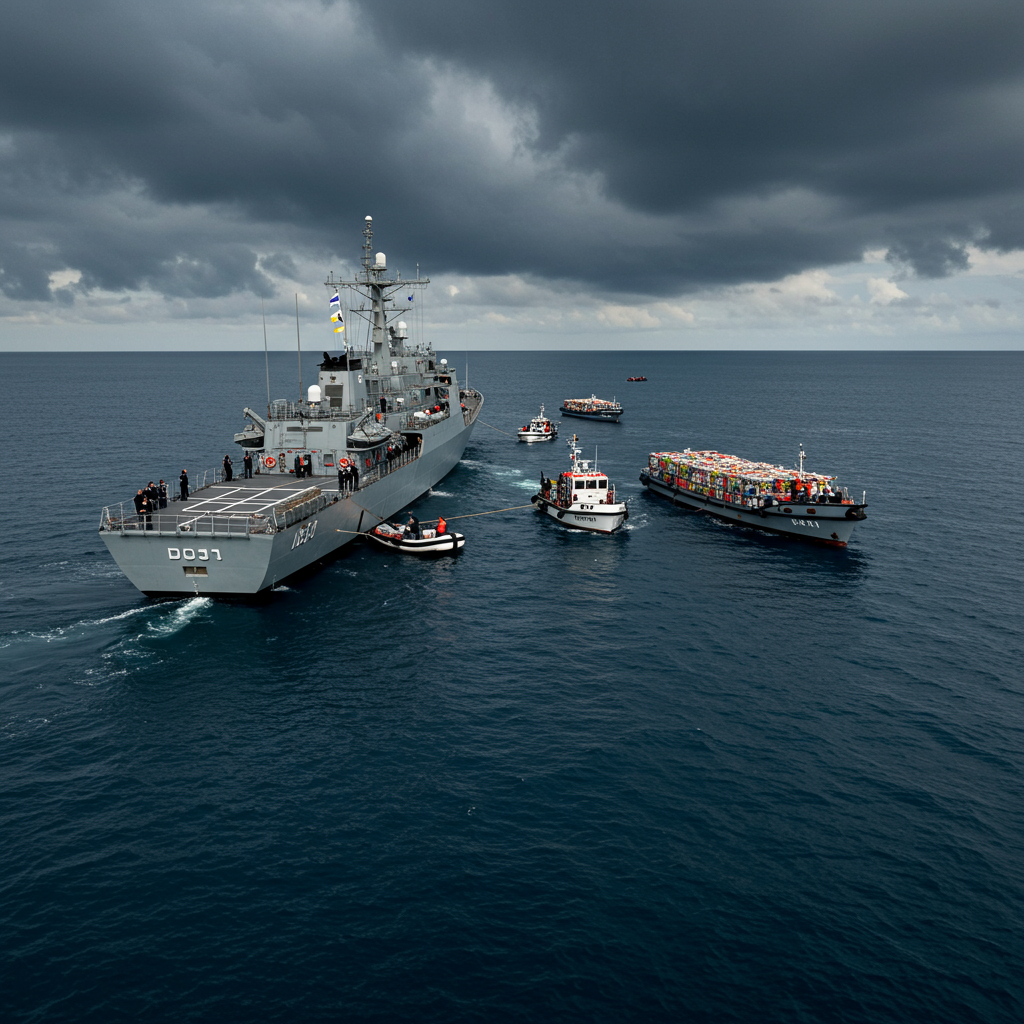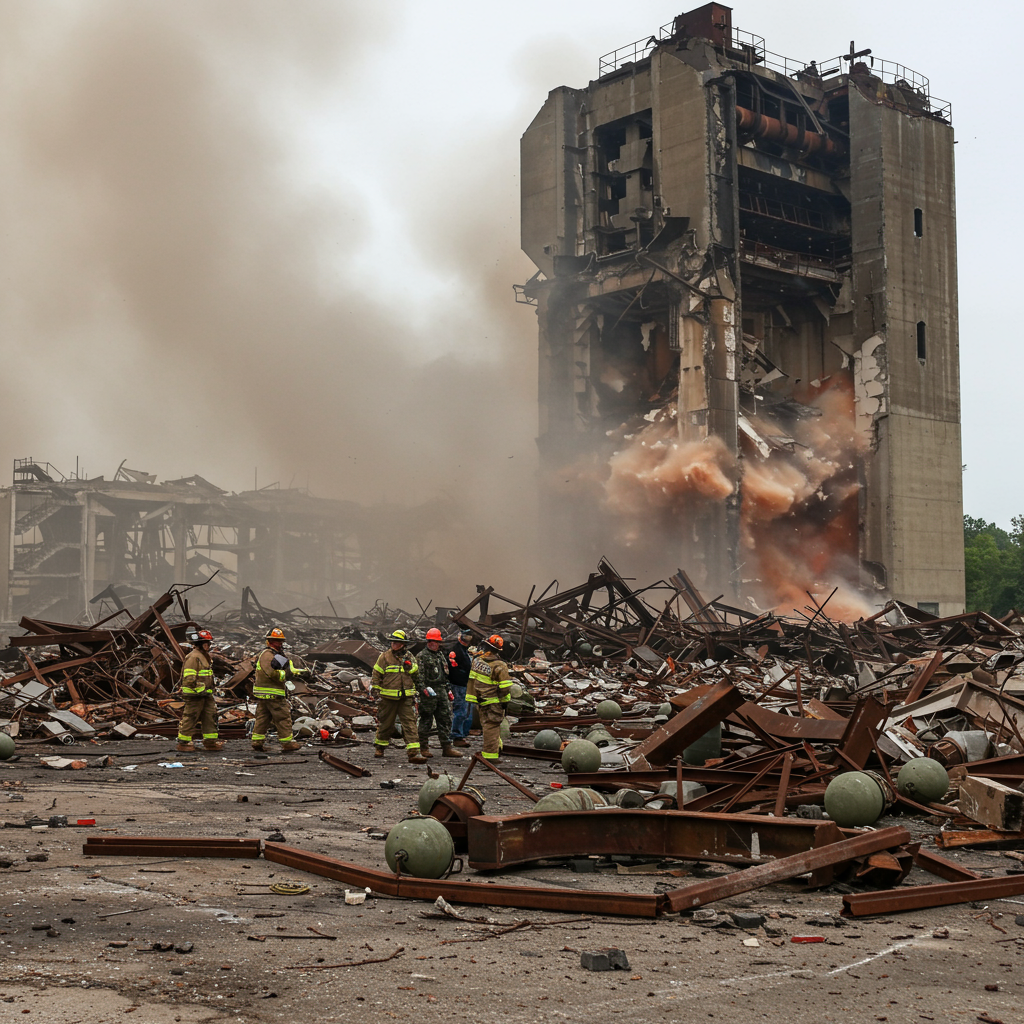The global stage erupted in immediate outrage and condemnation following Israel’s interception of the Global Sumud Flotilla (GSF) on October 1, 2025. This international aid convoy, carrying crucial humanitarian supplies, was en route to the besieged Gaza Strip. The incident triggered widespread protests and a chorus of criticism from governments, unions, and international bodies worldwide. Nations across continents quickly voiced their alarm, demanding explanations, aid delivery, and the release of detained activists. This event has intensified scrutiny on Israel’s ongoing blockade of Gaza and reignited urgent calls for adherence to international law.
The Flotilla’s Humanitarian Mission and Its Interception
The Global Sumud Flotilla embarked with a clear mission: to deliver essential aid to Gaza’s struggling population and establish a humanitarian corridor. It comprised approximately 500 civilian volunteers from at least 44 countries, including the United States, United Kingdom, Belgium, Spain, Malaysia, Turkiye, and Colombia. Prominent figures like environmental activist Greta Thunberg and Nelson Mandela’s grandson, Nkosi Zwelivelile “Mandla” Mandela, were among the participants. The flotilla carried vital medical supplies and food, desperately needed in Gaza, where parts of the territory had reportedly declared famine.
As the vessels sailed towards Gaza, they faced significant challenges. Lawmakers reported that drones targeted the ships on at least three occasions before they neared Gazan waters. Israeli forces ultimately intercepted most of the fleet when it was approximately 70 nautical miles offshore. According to the GSF Türkiye Delegation, Israeli troops illegally boarded three vessels – the Alma, Sirius, and Adara – at around 8:30 pm local time. Allegations quickly emerged that Israeli forces disrupted the ships’ communication systems, preventing distress calls during the boarding process. While many ships were intercepted, ship tracking data suggested that one French-flagged vessel, the Mikeno, might have reached “Palestinian territorial waters” before contact was lost. Israel reiterated its policy of preventing any vessel from breaching the blockade and entering what it designated as an active combat zone, stating that all passengers were “safe and in good health.”
A Torrent of Global Condemnation
The interception sparked a rapid and forceful international response. Governments expressed reactions ranging from outright condemnation to urgent demands for consular access for their detained citizens. The Palestinian Foreign Ministry swiftly condemned the “attack and aggression,” emphasizing the flotilla’s right of free passage in international waters, a right recognized under international law. They stated Israel must not interfere with freedom of navigation.
Turkiye’s Ministry of Foreign Affairs labeled Israel’s intervention “an act of terrorism” that violated international law and endangered innocent lives. The ministry asserted that Israel’s actions demonstrated the “fascist and militarist policies” of the “genocidal Netanyahu government” extended beyond Palestinians. President Recep Tayyip Erdoğan himself called Israel’s conduct “banditry,” vowing support for all passengers, including Turkish citizens. Malaysia’s Prime Minister Anwar Ibrahim demanded the immediate release of his country’s citizens, pledging to hold Israel accountable and accusing it of disregarding Palestinian rights and “trampling on the conscience of the global community.”
South Africa’s President Cyril Ramaphosa called for the immediate release of all participants, confirming the detention of Nelson Mandela’s grandson. He urged Israel to ensure the life-saving cargo reached Gaza’s people, clarifying the flotilla represented solidarity, not confrontation. In a powerful diplomatic move, Colombia’s President Gustavo Petro announced the expulsion of Israeli diplomats and the cancellation of a free trade agreement with Israel. He called for legal demands, including through Israeli courts, to secure his citizens’ return. Pakistan’s Prime Minister Shehbaz Sharif condemned the “dastardly attack” and called for an end to “barbarity,” prioritizing peace and humanitarian aid access.
European and Other Responses
European nations also registered their deep concern. The UK government declared itself “very concerned,” confirmed British nationals were on board, and demanded the aid be delivered safely to Gaza through humanitarian organizations. A UK MP, Mike Martin, specifically voiced worry for an RAF veteran among the detainees. Germany called on Israel to “comply with their obligations under international law” and “act with proportionality,” also seeking guarantees for the protection of those on board. Spain demanded respect for the “physical integrity and rights of Spanish citizens” and extended diplomatic protection to its citizens.
Italy’s Foreign Minister Antonio Tajani reported Israel’s assurance of “no violent actions.” However, Italian unions called for a general strike in solidarity with the GSF and Gaza. Prime Minister Giorgia Meloni pledged to ensure citizens’ return but criticized the flotilla and protests as not benefiting Palestinians. Greece issued a joint statement with Italy, demanding Israel ensure participant safety and consular protection. Irish President Michael D Higgins stated Israel was preventing essential aid from Gaza, voicing concern for all nations involved. Belgium’s Foreign Minister Maxime Prevot urged Israel to respect international law, prioritizing the safety and swift return of Belgian citizens. France’s Ministry for Europe and Foreign Affairs called for consular access for its citizens and their “return without undue delay.” The France Unbowed party, with parliamentarians on board, accused Israel of “piracy,” and its leader, Jean-Luc Mélenchon, strongly criticized France’s foreign minister for perceived alignment with Netanyahu.
Within the United States, twenty Democratic legislators urged the White House to act to protect the flotilla. The Council on American-Islamic Relations (CAIR), the largest U.S. Muslim advocacy group, accused Israel of “kidnap humanitarian activists and engage in piracy in international waters,” calling on nations to forcibly break the Gaza siege.
The Humanitarian Crisis and Broader Context
The interception occurred amidst a deepening humanitarian crisis in Gaza. Aid agencies repeatedly call for unhindered access to the territory, where 2.3 million residents face rapidly deteriorating living conditions due to Israel’s 15-year blockade. The situation is exacerbated by a “deadly mix of disease, displacement, lack of medical care and malnutrition,” particularly affecting young children and pregnant women. Heart-wrenching stories emerged, such as Nancy Abu Matrou, a mother fighting for her cancer-stricken daughter, Etra, having already lost three other children and twins prematurely during the conflict. Children’s hospitals have shut down, and essential medical equipment like incubators and ventilators are severely lacking.
This incident also underscored the ongoing diplomatic tensions surrounding the Israel-Gaza conflict. While many Western nations have recognized Palestinian statehood, they universally demand Hamas not be part of any future government. This contrasts sharply with Prime Minister Netanyahu’s explicit statement that Israel would not permit an independent Palestinian state. U.S. President Donald Trump, after meeting with Netanyahu, had unveiled a 20-point peace plan, with Hamas acknowledging receipt but not yet responding.
UN and Expert Voices: A Harsh Critique
Francesca Albanese, the UN special rapporteur on Palestine, offered a particularly scathing critique. She stated the Israeli intervention highlighted the “complicit inaction” of Western governments towards Prime Minister Benjamin Netanyahu’s administration. Albanese powerfully described Gaza as “Israel’s killing fields,” lamenting the illegal abduction of those who risked their lives to break the unlawful blockade. Her strong words underscore the perceived failure of international bodies and powerful nations to protect humanitarian efforts and uphold international law in the region.
Frequently Asked Questions
What was the Global Sumud Flotilla’s mission to Gaza?
The Global Sumud Flotilla, comprising approximately 500 civilian volunteers from over 40 countries, aimed to deliver vital humanitarian aid to the Gaza Strip. Its mission was explicitly to provide essential medical supplies and food to the war-ravaged territory, where residents faced a severe humanitarian crisis, including widespread famine. The flotilla also sought to establish a humanitarian corridor and challenge the long-standing Israeli blockade.
Which nations strongly condemned Israel’s interception of the flotilla?
A wide array of nations strongly condemned Israel’s actions. Turkiye labeled it an “act of terrorism” and “banditry.” Malaysia, South Africa, and Pakistan vehemently denounced the interception, demanding the immediate release of their citizens and the aid. Colombia took the most drastic diplomatic step, expelling Israeli diplomats and canceling a free trade agreement. European countries like the UK, Germany, Spain, Ireland, and Belgium also expressed deep concern and called for adherence to international law and the safe return of their nationals.
What are the alleged international law violations regarding the Gaza flotilla incident?
Critics, including the Palestinian Foreign Ministry and Turkiye, alleged that Israel’s interception constituted a violation of international law, specifically concerning the right of free passage in international waters and interference with freedom of navigation. They contended that Israel has no sovereignty over Palestinian territorial waters and that the actions, including alleged drone attacks and communication disruptions, endangered peaceful, unarmed humanitarian aid workers. Some called it “piracy” and an “act of terrorism” against a humanitarian mission.
Conclusion: Intensified Pressure and Lingering Questions
The interception of the Global Sumud Flotilla on October 1, 2025, represents a significant escalation in the ongoing Israel-Gaza conflict, drawing unprecedented global attention and diplomatic backlash. The incident amplified calls for accountability and an end to the Gaza blockade, highlighting the desperate need for humanitarian aid to reach suffering populations. The strong rhetoric from world leaders, combined with the detailed accounts of the interception and the severe humanitarian context, ensures that the international community will continue to scrutinize Israel’s actions and policies. The detention of prominent activists like Greta Thunberg and Nelson Mandela’s grandson further spotlights the human element of this contentious issue. As nations grapple with these diplomatic consequences, the core demands for safe passage of aid and respect for international law remain at the forefront. The future of aid efforts to Gaza, and indeed the broader peace process, will undoubtedly be shaped by the fallout from this pivotal event.



